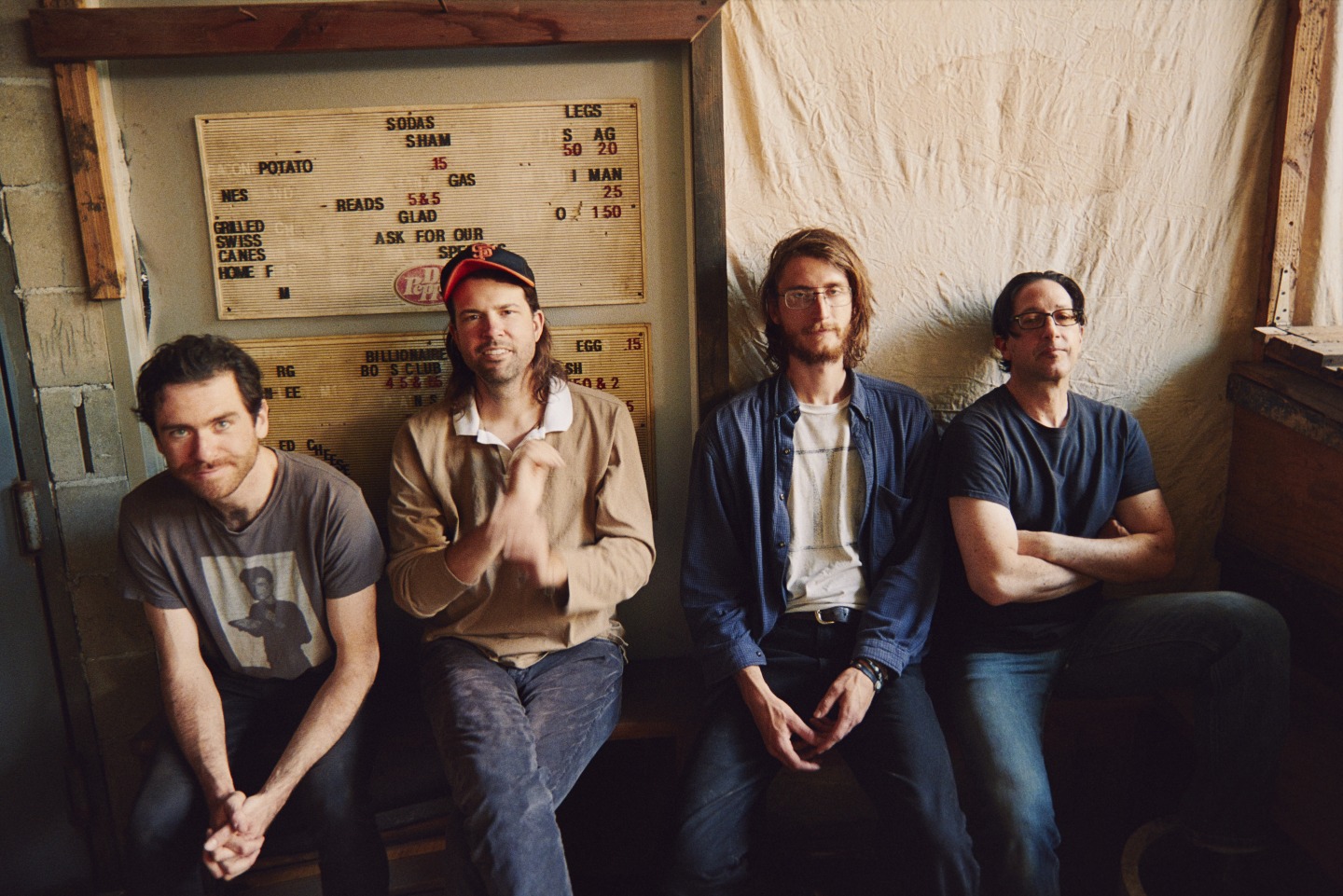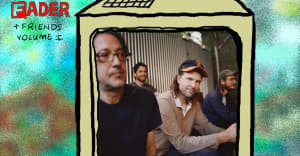 Mitchell Wojcik
/
Hive Mind
Mitchell Wojcik
/
Hive Mind
John Ross already knew that he wanted to take a different approach to Wild Pink’s fourth album. His band’s third record, A Billion Little Lights, had been vast and swooning, combining Springsteen’s heartland grandeur with the chiming melodies of early Band of Horses. It had a sheen and a shimmer to it. He’d started writing the follow-up before A Billion Little Lights was released in February 2021, and the new music intentionally had a rougher texture, a little more dirt beneath its nails.
He was six months into the writing process when he was diagnosed with cancer. He had to book surgery to remove some of his lymph nodes, though the earliest date he could lock down fell after Wild Pink was scheduled to enter the studio to record their new album. He considered delaying the record indefinitely, but, partly on the advice of his doctors, he soon decided to stick with it. ILYSM, out via Royal Mountain on October 14, was written in part and recorded in full while Ross dealt with the uncertainties and physical strains of his diagnosis.
The latest single from the album, “Hold My Hand,” featuring Julien Baker, is one of the starkest reminders of the new textural approach that Ross wanted to take on ILYSM, and the new lyrical approach that he inevitably took after his diagnosis. "I wrote that song right after my first surgery, about lying on the operating table where a member of the surgical team held my hand right before I went under,” he wrote in a statement this morning. “It sounds kind of arbitrary, and like it shouldn’t have been as impactful as it was, but I felt very comforted and wanted to capture that loving feeling in the song.”
It’s one of ILYSM’s quietest moments, with Ross and Baker singing in near-whispers, led by the piano of David Moore, best known as the leader of the ambient project Bing & Ruth. It also captures something of ILYSM’s collaborative nature. There are guest appearances from J Mascis, Ryley Walker, Yasmin Williams, and Samantha Crain, and Ross was joined as a producer by Justin Pizzoferrato and The Antlers’ Peter Silberman. It seems obvious that, after such a terrifying diagnosis, Ross could have turned in on himself or shut people out. Instead, as ILYSM and my conversation with him last week made clear, he chose emphatically to open the album up and forge new connections.
This Q&A has been edited and condensed from an episode of The FADER Interview live on Amp.
A Billion Little Lights was pretty much universally lauded on its release. When you came to start writing after a success like that, do you feel a moment of paralysis?
I didn't share in that feeling afterwards. I'm proud of that record and I'm so glad that people seem to enjoy it, but I think I did exhaust whatever was in the hopper to make that record then. The pandemic, too, just diverted me away from music for a good six or eight months. By the time I started writing again, I felt like I had a bit of a new perspective. I felt like I had gotten something out of my system. I was ready to start on some new concept for a record.
What was that concept?
I feel like A Billion Little Lights was very produced, it had very full-sounding songs. The record has a sheen to it, a digital lacquer. I wanted to get away from that. I always feel like when I write a record, I evaluate it after the fact and change my course for the next record. It was important to have a more stripped-down, acoustic vibe on this next record. I play acoustic guitar primarily on this record. There's a lot of upright bass and acoustic piano.
You had a very difficult time yourself through this album. How far into the writing process were you when everything was turned upside down?
I was a few months into writing the record when I found out. I saw what I was doing in a different light at that point, and really debated how important it was to continue. We had the studio time booked right when I found out that this cancer had spread to my lymph nodes. I had to basically have surgery to remove a bunch of lymp hnodes, but I just went on with the studio time because we couldn't do the surgery any sooner. It was like there was a sense of urgency. There was a unique feeling to the actual recording process of this record. I think it brought a level of focus into the group that I don't think would've been there otherwise, and I think it's pretty evident in the recordings, to my ears.
You say you debated whether or not to continue with the record. What was that conversation with yourself like? And why did making the album win?
It was a very healthy thing for me mentally to just go all in on the recording process. I think that if I didn't have this [and] put everything into it, I would've probably fallen apart/ And then, actually, my surgeon at the time told me pretty explicitly, "You have to keep living and doing your normal life for that reason.” That helped me make the decision as well.
Recording an album, at the best of times, can be physically quite demanding. How did that feel for you?
We would do probably eight-hour days. It was physically pretty taxing, and then obviously mentally taxing. But at the same time, it was exactly what I needed and wanted to be doing.
It's strange, when you have cancer, what’s normal and what's considered good news. It's hard to explain. You can be told something really terrible, but if it's not as bad as you thought it was going to be, that's actually good news in a strange way.
An artist’s relationship with an album always changes between completing it and releasing it, but in your case so much has happened in your life since you left the studio. How has this record changed in your head?
I definitely go through doubts and [moments of] feeling insecure about it. But I was definitely very distracted in the time following the recording process, which is kind of nice in that regard. At this point, I feel pretty confident about what I'm doing. I still feel like I'm finding my voice in a lot of ways, but I'm very glad to be making records and trying to make it count each time.
There is an assuredness to the last two records. On the covers album [2021’s Six Cover Songs] you seemed to be approaching those songs with such confidence too. You think you're still finding your voice?
Absolutely. I'm writing new music now that I think is different than ILYSM. I don't know if I'm ever going to be totally at home in what I'm doing.
Have you surprised yourself with how quickly you’ve been able to record and release an album, book a tour, and do a press cycle given the diagnosis?
Totally. I'm in surveillance mode, is what it's called, just keeping an eye on everything with my health. I feel like anything could happen before this tour happens. I feel like nothing is written in stone. I do feel like it's all happened pretty quickly. We did a tour in October of last year with Ratboys and I had a cancer surgery about three months before we left.
It's just been such a strange time navigating all of this that coexisted together. Then, of course, there’s the pandemic component to everything. I think we're all getting used to the idea of things getting canceled at the last minute. It just feels like we’re making plans and hoping everything works out.
